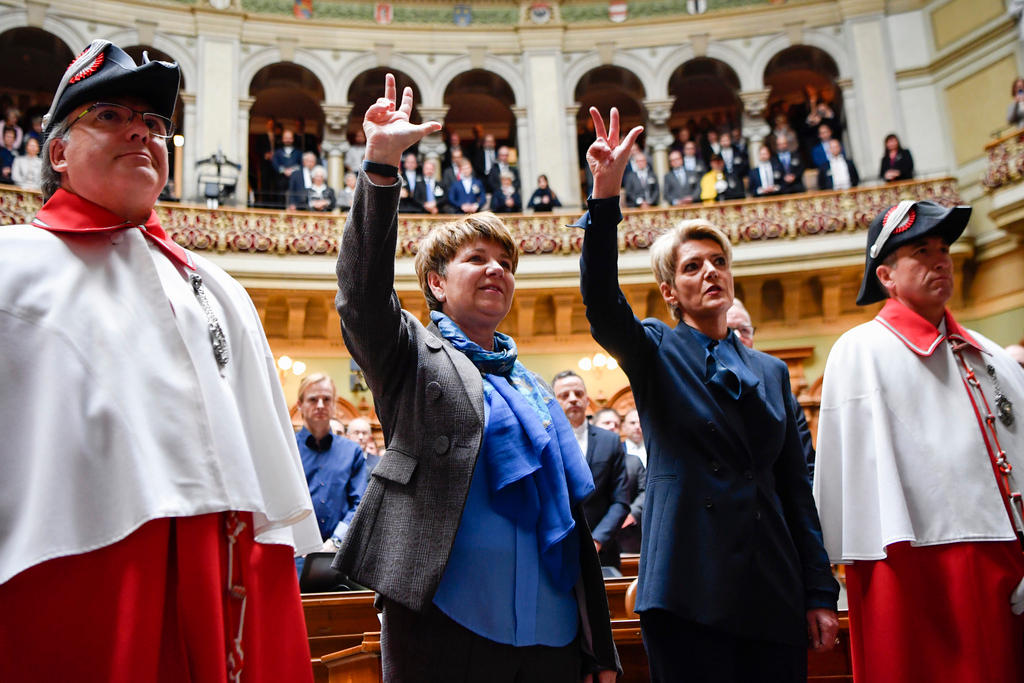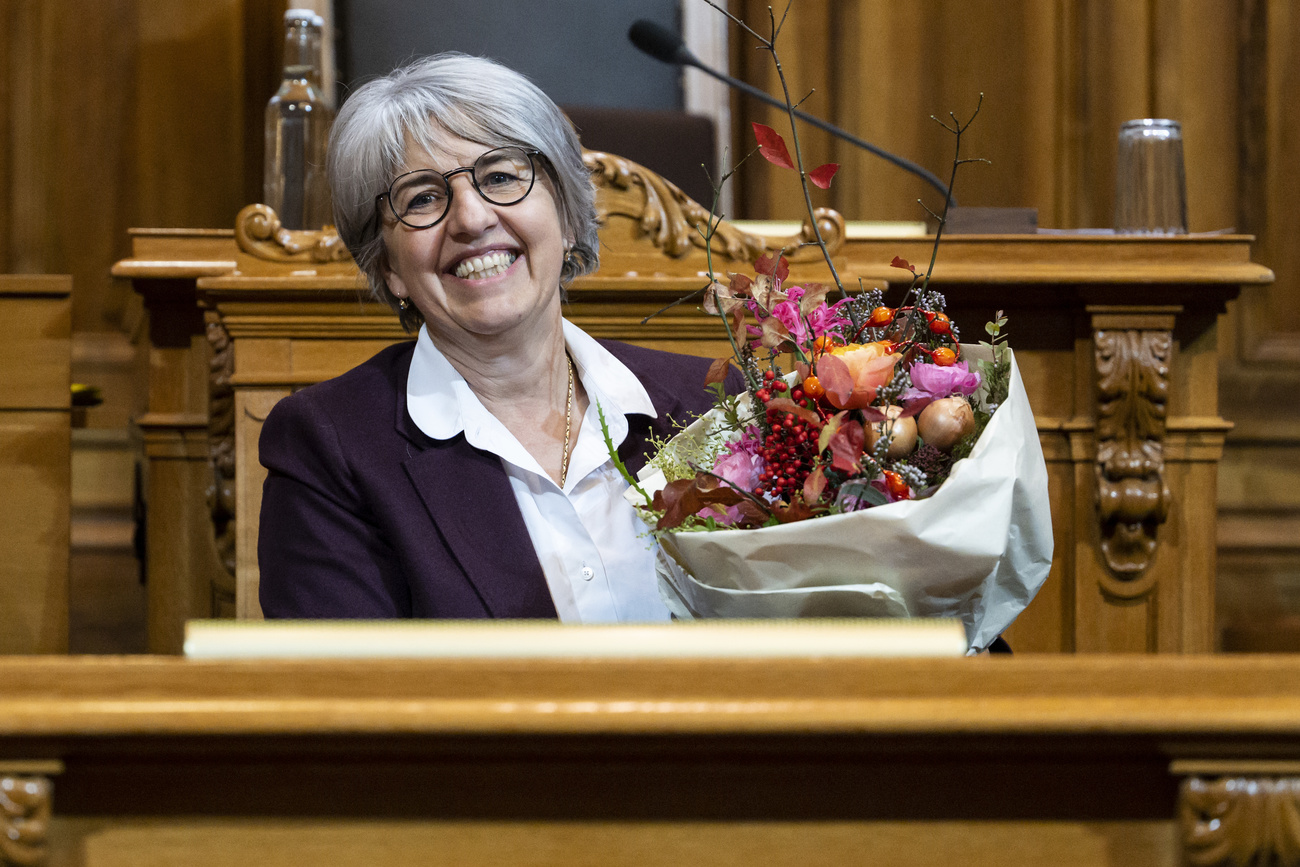
Viola Amherd and Karin Keller-Sutter elected to government

Viola Amherd and Karin Keller-Sutter have been chosen by parliament to join Switzerland’s seven-person executive, the Federal Council.
AmherdExternal link, a member of the centrist Christian Democratic Party, replaces party colleague Doris Leuthard, who is standing down at the end of the month after a 12-year stint in cabinet.
Also on Wednesday morning, the Federal Assembly – the 200 members of the House of Representatives and the 46 members of the Senate – picked Karin Keller-SutterExternal link from the centre-right Radical-Liberal Party to replace Johann Schneider-Ammann, who is retiring after eight years in cabinet.
+ Who are the two new Federal Councillors?
+ Federal Councillor: from election to departureExternal link
Amherd, a 56-year-old lawyer from canton Valais in southwest Switzerland has sat in the House of Representatives since 2005. She defeated party colleague Heidi Z’graggen by receiving 148 votes out of the 240 cast in the first round of voting.
In her acceptance speech, Amherd said she would carry out her office with humility and sincerity and focus on working with her colleagues as a unit to find efficient and pragmatic solutions.
“In order to find durable solutions, I need your support,” she said, calling for parliamentarians to treat each other with respect. “Let’s work together for the future of our country.”

More
Women in the Federal Council – a history
No surprises
There were no surprises with the nomination of Keller-Sutter, who had been the clear favourite over party colleague Hans WickiExternal link. She received 154 of the 237 votes cast.
The 54-year-old Senate president from canton St Gallen in northeast Switzerland has ambition: she was up for a ministerial position in 2010 but lost out to Schneider-Ammann. Before her political career she worked as a conference interpreter and a secondary school teacher.
In her acceptance speech, Keller-Sutter agreed with Amherd that cooperation was the way to go. “In our country one person has only a limited influence – and limited time. If we want to come up with solutions, we can only do that together,” she said.
Keller-Sutter also commented on the Radical-Liberal Party’s poor record with women in the cabinet: Elisabeth Kopp, the first female cabinet minister ever, from 1984-1989, was until now the party’s only female representative at a federal level.
“With my election, a thorny chapter for Radical-Liberal women has been closed. After an absence in government of almost 30 years, I have the honour of being a Federal Councillor. I believe things can now return to normal,” she said.

More
How are Swiss government members elected?
‘Strong symbol’
The election of two women in one day to the Federal CouncilExternal link is a “strong symbol”, Nenad Stojanovic, a political scientist at the University of Geneva, told swissinfo.ch. Women have only held the right to vote in Switzerland since 1971, and just seven had previously sat on the executive body since 1848, while 117 men have held the position.
The pair will join Simonetta Sommaruga to make a total of three women from seven on the Federal Council, a ratio that catapults Switzerland into the top ten governments worldwide for equal representation. Parliament remains largely male, however, especially the Senate, where just 15% of members are women.
According to some interpretations, the fact that the Christian Democrats and Radical-Liberals pushed female candidates could also help to raise their party profiles for national elections in 2019. The former are hoping to mitigate losses in recent years, the latter to consolidate gains to become possibly the second-biggest party in the country.
As regards the composition of the new Federal Council, which will sit for the first time in early 2019, Stojanovic said, Wednesday’s elections make for a rather right-leaning body, though this does not mark a huge shift from the past two years.
Keller-Sutter, a conservative liberal, will bring to four the number of ministers on the right or centre-right, whereas three remain left, or centrist (including Amherd), figures.
Whether this will have an impact on certain key dossiers is uncertain. All-important relations with the European Union – the government is currently formulating its position on a contentious framework agreement – are unlikely to change, said Stojanovic. The agenda here is more often dictated by Brussels in any case, he said.
As regards portfolios, outgoing ministers Leuthard and Schneider-Ammann are leaving behind them the energy/environment/transport/communications and the economics departments respectively. It is not yet clear which dossiers the two new Federal Councillors will inherit.
Keller-Sutter and Amherd will take up their posts on January 1, 2019.
Also on Wednesday, parliament rubber-stamped current vice-president Ueli Maurer as president for 2019.

More
Switzerland’s 21 living ex-presidents: a world record

In compliance with the JTI standards
More: SWI swissinfo.ch certified by the Journalism Trust Initiative


























You can find an overview of ongoing debates with our journalists here . Please join us!
If you want to start a conversation about a topic raised in this article or want to report factual errors, email us at english@swissinfo.ch.